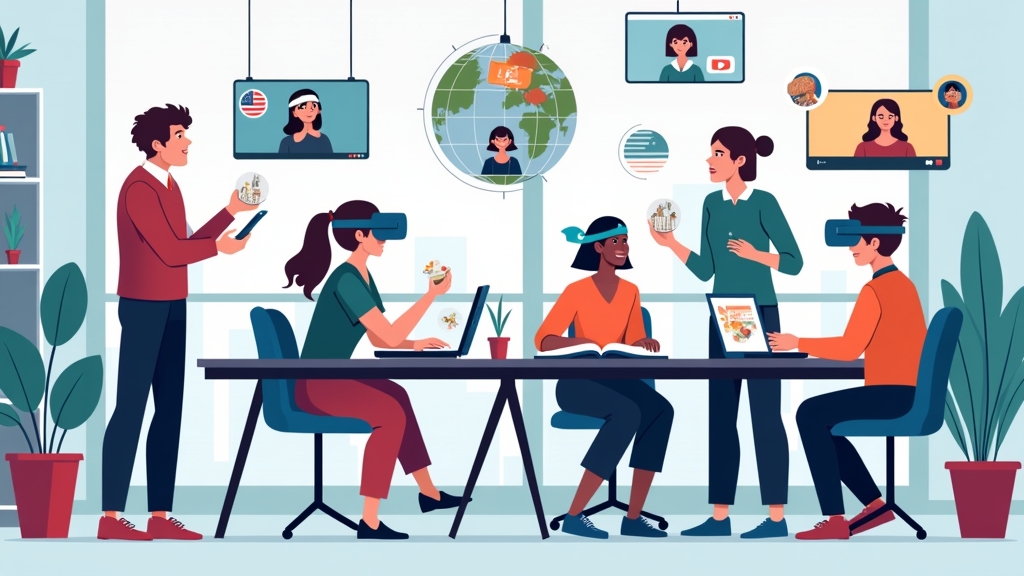Cultural Immersion Learning: Developing Global Skills without Leaving Home
Imagine mastering French like a Parisian, understanding the nuances of the Chinese market or negotiating like an American executive - all without having to cross borders. Cultural immersion learning is a powerful technique that allows you to absorb global knowledge and skills in depth, even if you have no plans to live abroad. In this article, we'll explore practical strategies for turning your local environment into an international skills laboratory.
What Cultural Immersion Learning Is and Why It Works
Cultural immersion goes far beyond watching foreign films or listening to music in another language. It's about recreating authentic experiences which simulate living in another culture, stimulating adaptability, intercultural communication and critical thinking. Research shows that this method accelerates learning because it involves multiple senses and contexts, creating stronger connections in the brain.
For example, a professional who wants to work with the Japanese market can take part in local tea ceremonies, study Japanese corporate etiquette and even practise the keigo (formal language) with online natives. Platforms such as italki connect learners to native speakers for realistic conversation sessions.
But why is this more effective than traditional methods? The answer lies in neuroplasticity. When you expose yourself to complex cultural situations - even simulated ones - your brain develops new neural pathways to process social and linguistic information. It's like training in a flight simulator before flying a real airplane.
How about starting today? Try replacing 30 minutes of your daily content consumption with materials in the language or culture you want to master. Subscribe to international newsletters, such as BBC Worklifeto understand how global professionals think and act.
Creating an Immersive Environment at Home or at Work
You don't have to travel to experience cultural immersion. Small changes in your physical and mental space can make a huge difference. Turn your home into a microcosm of the target culture. Change the language of your cell phone and computer, cook typical dishes following authentic recipes (sites like Just One Cookbook offer Japanese options, for example) and decorate a corner with symbolic objects, such as a Chinese lunar calendar or a matryoshka Russian.
In the professional environment, propose meetings in English (or another relevant language) once a week. If you work in a team, create a monthly "cultural day" where each member presents an aspect of a different country - from business norms to local slang. Companies like TEDx organize global events that can be watched online, offering valuable insights.
How about using technology to your advantage? Tools such as HelloTalk allow you to exchange messages with native speakers, while Netflix offers series and documentaries in more than 20 languages with customizable subtitles. Watch "Elite" in Spanish or "Dark" in German, for example, paying attention not only to the words, but to gestures and social contexts.
The secret is consistency. Devote at least an hour a day to these activities. Write down new expressions, reflect on cultural differences and, above all, make mistakes. They are an essential part of the process.
Developing Intercultural Skills without Leaving the Country
Intercultural skills go beyond language. They include empathy, flexibility and the ability to read complex social situations. How can we practice this in our daily lives? One tip is to take part in international discussion groups. Platforms such as Meetup list virtual events on a variety of topics, from technology to art, connecting you with people from different nationalities.
Another strategy is to study real global business cases. Why did Disney adapt its parks in China? How did Starbucks fail in Australia? Analyze these examples (available on sites such as Harvard Business Review) helps to understand how different cultures approach consumption, leadership and communication.
You can also simulate challenging professional situations. For example: how would you react if an Arab client refused a contract because you prefer to negotiate in person? Or if a Finnish colleague seemed "cold" because he values silence in meetings? Role-playing with friends or mentors can prepare you for these scenarios.
Don't underestimate the power of observation. Watch videos of international conferences at the World Economic Forum and notice how the participants greet each other, dress or argue. These details make the difference in a global career.
Harnessing Local Diversity to Practice Global Skills
Your city is probably home to international communities - universities, cultural centers or multinational companies. Engage with them. Volunteer at ethnic festivals, go to restaurants where the owners are immigrants (and talk to them about their backgrounds) or take part in face-to-face language exchanges.
Organizations such as AFS offer programs for living with foreigners, even for adults. If you live near an embassy or consulate, check to see if they hold events open to the public. Many, like the French Institute, organize free lectures and workshops.

At work, suggest diversity initiatives. A company with colleagues from different countries can create a "cultural database", where everyone shares tips on how to do business in their home country. This not only enriches the team, but also positions you as an intercultural facilitator.
What if your reality is more limited? Use social media strategically. Follow foreign influencers on LinkedIn or Instagram who discuss professional topics. For example, consultant Erin Meyer, author of "The Culture Map", posts daily analyses of cultural differences in business.
Technology and Tools to Deepen Immersion
The digital age has democratized access to foreign cultures. Make smart use of these resources. Apps like Duolingo are useful for basic vocabulary, but go further: platforms like Coursera offer courses taught by foreign universities, many free of charge.
For real-time immersion, try the Verblingwhere native teachers teach languages via videoconference, or the Tandem, which combines learning with cultural exchange. Want to feel the pulse of a foreign city? Access live broadcasts from local radio stations at Radio Garden or explore the streets via Google Maps.
Don't ignore the games. MMORPGs like "World of Warcraft" or "Final Fantasy XIV" have active global communities where you practice languages and collaborate with players from all over the world. Even Minecraft can be a tool - international servers teach you about cross-cultural teamwork.
Finally, create an "immersion diary". Record discoveries, phrases learned and situations that challenged you. Revisiting these notes will solidify your learning and show your progress.
Measuring Your Progress and Adjusting Your Strategy
How do you know if you're really developing global competencies? Set clear and measurable goals. For example: "In three months, I want to be able to watch a webinar in German without subtitles" or "I'm going to lead a meeting in English without preparing a script".
Carry out regular self-assessments. Tools such as Cultural Orientations Indicator help map your evolution in dimensions such as hierarchy, direct/indirect communication and time orientation. Ask international colleagues or mentors for feedback - platforms like Mentoring Club connect professionals with experienced advisors.
Adjust your approach as necessary. If after months of study you still find it difficult to understand accents, focus on podcasts with different language varieties (the BBC Sounds has some excellent options). If cultural concepts still seem abstract, read biographies of expats or watch daily life vlogs on YouTube.
Remember: global competence is not a destination, but a journey. Celebrate small victories, such as recognizing a cultural joke or resolving a misunderstanding in a virtual negotiation.
Applying Skills in International Careers
All this immersion will be of little value if it is not translated into real opportunities. Integrate your skills into your CV and networking. On LinkedIn, highlight projects with multicultural teams or courses at foreign institutions. Use terms like "intercultural sensitivity" or "fluency in global contexts" in your description.
Look for companies with an international presence, even if they are based in Brazil. Multinationals such as 3M or Coca-Cola FEMSA value professionals who understand global dynamics. Apply for positions that involve contact with headquarters or external clients.
If possible, propose initiatives that link your company to foreign markets. A marketing analyst might suggest researching Mexican consumers; an engineer, benchmarking German practices. Be the cultural link in your organization.
Finally, consider globally recognized certifications, such as the TOEFL for languages or the Hogan Cultural Assessment for intercultural skills. They validate your skills with employers.
The world is waiting for you - and it starts in your living room. What first step will you take today?



